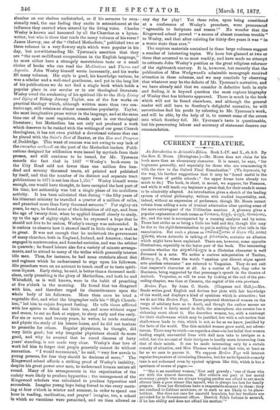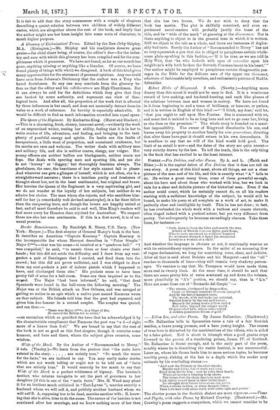Broken Toys. By Anna C. Steele. (Chapman and Hall.)—Mrs.. Steele
writes good English and devises her plots with fair knowledge of the world, and displays a kind of cynicism which is attractive ; but we do not like Broken Toys. These perpetual sketches of women on the verge of adultery bore us to death, and though the author means no harm, indeed is fairly moral in drift, the atmosphere she creates has sickening scent about it. She describes women, too, with a contempt for their shallowness which may be justified, but with a sub-notion that shallowness leads to vice, which is not, so far as we know, justified by the facts of the world. The thin-minded women grow acrid, not adven- turous. There may be truth—as regards a class—in her belief that women leading stupid, uneventful lives with dull men take to intrigue as a relief, but the account of their intrigues is hardly more interesting than that of their minds. It can be made interesting only by a certain comedy of situation, and Miss Thomas worked out that vein, at least as far as we care to pursue it. We suppose Broken Toys will interest regular frequenters of circulating libraries, but for us its Spanish-comedy tone is not redeemed even by cynical epigram like this, which is but a specimen of scores of pages :- "' She is an excellent woman,' Nest said gravely ; ' one of those who err with the utmost decorum. Her collects are part of her moral economy ; people who are always begging pardon can afford to err mach oftener than a poor sinner like myself, who is always too late for family prayers. Even her flirtations have a respectable element in them : they are confined to Cabinet ministers, or to such as are likely to be place- holders. She does not care for emerald bracelets, but her brothers are provided for in Government offices. Derrick Erie's fortune is assured, if he has ability and does not offend his mother."
It is fair to add that the story commences with a couple of chapters describing a quaint relation between two children of widely different astes, which are altogether above the rest of the book, and imply that the author might use her keen insight into some sorts of character, to much higher purpose.



































 Previous page
Previous page